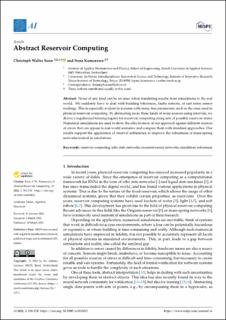Please use this identifier to cite or link to this item:
https://doi.org/10.21256/zhaw-25026Full metadata record
| DC Field | Value | Language |
|---|---|---|
| dc.contributor.author | Senn, Christoph Walter | - |
| dc.contributor.author | Kumazawa, Itsuo | - |
| dc.date.accessioned | 2022-05-20T15:11:55Z | - |
| dc.date.available | 2022-05-20T15:11:55Z | - |
| dc.date.issued | 2022-03-10 | - |
| dc.identifier.issn | 2673-2688 | de_CH |
| dc.identifier.uri | https://digitalcollection.zhaw.ch/handle/11475/25026 | - |
| dc.description.abstract | Noise of any kind can be an issue when translating results from simulations to the real world. We suddenly have to deal with building tolerances, faulty sensors, or just noisy sensor readings. This is especially evident in systems with many free parameters, such as the ones used in physical reservoir computing. By abstracting away these kinds of noise sources using intervals, we derive a regularized training regime for reservoir computing using sets of possible reservoir states. Numerical simulations are used to show the effectiveness of our approach against different sources of errors that can appear in real-world scenarios and compare them with standard approaches. Our results support the application of interval arithmetics to improve the robustness of mass-spring networks trained in simulations. | de_CH |
| dc.language.iso | en | de_CH |
| dc.publisher | MDPI | de_CH |
| dc.relation.ispartof | AI | de_CH |
| dc.rights | http://creativecommons.org/licenses/by/4.0/ | de_CH |
| dc.subject | Reservoir computing | de_CH |
| dc.subject | Echo state network | de_CH |
| dc.subject | Recurrent neural network | de_CH |
| dc.subject | Simulation | de_CH |
| dc.subject | Robustness | de_CH |
| dc.subject.ddc | 006: Spezielle Computerverfahren | de_CH |
| dc.title | Abstract reservoir computing | de_CH |
| dc.type | Beitrag in wissenschaftlicher Zeitschrift | de_CH |
| dcterms.type | Text | de_CH |
| zhaw.departement | School of Engineering | de_CH |
| zhaw.organisationalunit | Institut für Angewandte Mathematik und Physik (IAMP) | de_CH |
| dc.identifier.doi | 10.3390/ai3010012 | de_CH |
| dc.identifier.doi | 10.21256/zhaw-25026 | - |
| zhaw.funding.eu | No | de_CH |
| zhaw.issue | 1 | de_CH |
| zhaw.originated.zhaw | Yes | de_CH |
| zhaw.pages.end | 210 | de_CH |
| zhaw.pages.start | 194 | de_CH |
| zhaw.publication.status | publishedVersion | de_CH |
| zhaw.volume | 3 | de_CH |
| zhaw.publication.review | Peer review (Publikation) | de_CH |
| zhaw.author.additional | No | de_CH |
| zhaw.display.portrait | Yes | de_CH |
| zhaw.monitoring.costperiod | 2022 | de_CH |
| Appears in collections: | Publikationen School of Engineering | |
Files in This Item:
| File | Description | Size | Format | |
|---|---|---|---|---|
| 2022_Senn-Kumazawa_Abstract-Reservoir-Computing.pdf | 5.2 MB | Adobe PDF |  View/Open |
Show simple item record
Senn, C. W., & Kumazawa, I. (2022). Abstract reservoir computing. Ai, 3(1), 194–210. https://doi.org/10.3390/ai3010012
Senn, C.W. and Kumazawa, I. (2022) ‘Abstract reservoir computing’, AI, 3(1), pp. 194–210. Available at: https://doi.org/10.3390/ai3010012.
C. W. Senn and I. Kumazawa, “Abstract reservoir computing,” AI, vol. 3, no. 1, pp. 194–210, Mar. 2022, doi: 10.3390/ai3010012.
SENN, Christoph Walter und Itsuo KUMAZAWA, 2022. Abstract reservoir computing. AI. 10 März 2022. Bd. 3, Nr. 1, S. 194–210. DOI 10.3390/ai3010012
Senn, Christoph Walter, and Itsuo Kumazawa. 2022. “Abstract Reservoir Computing.” Ai 3 (1): 194–210. https://doi.org/10.3390/ai3010012.
Senn, Christoph Walter, and Itsuo Kumazawa. “Abstract Reservoir Computing.” Ai, vol. 3, no. 1, Mar. 2022, pp. 194–210, https://doi.org/10.3390/ai3010012.
Items in DSpace are protected by copyright, with all rights reserved, unless otherwise indicated.